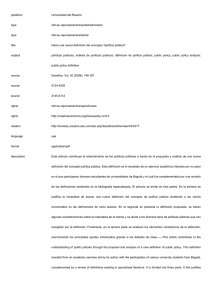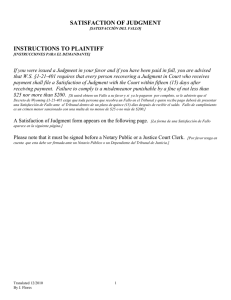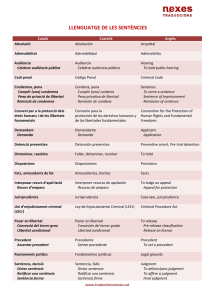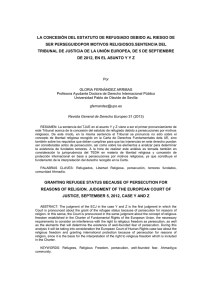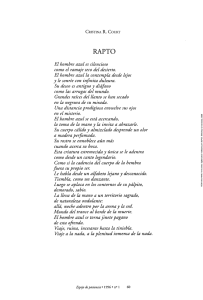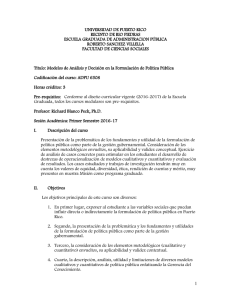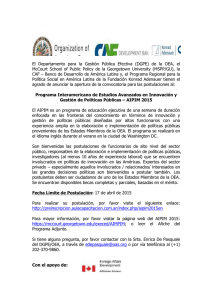a voorblad per land - International Bar Association
Anuncio
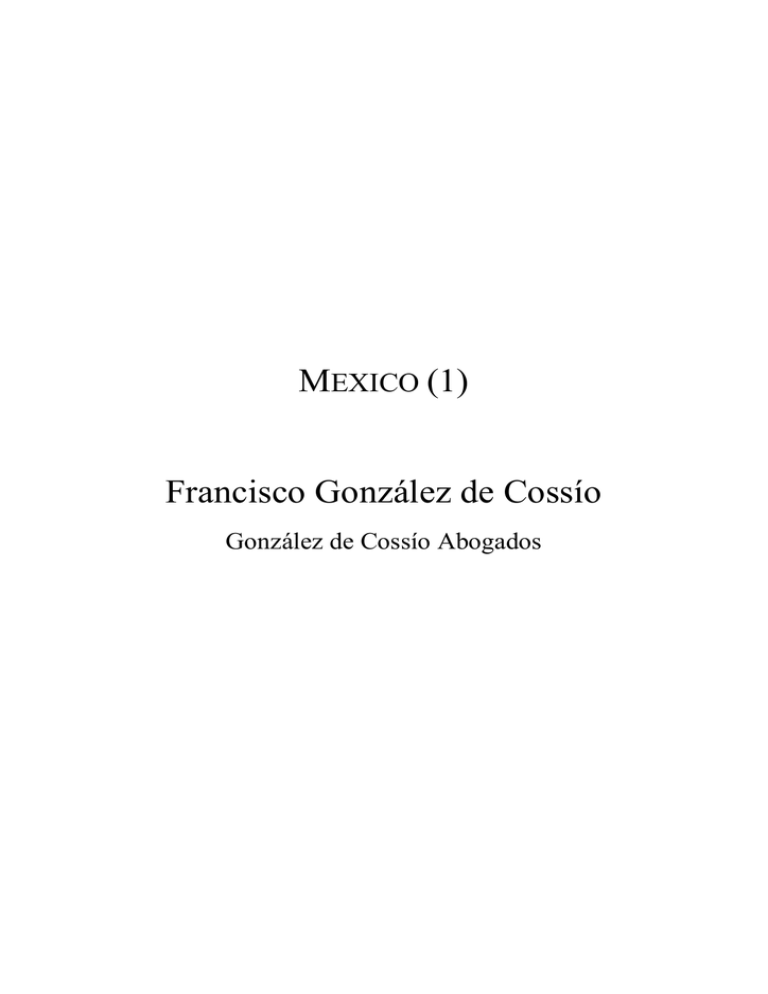
MEXICO (1) Francisco González de Cossío González de Cossío Abogados 29 September 2014 To: International Bar Association (IBA) Arbitration Committee Recognition and Enforcement of Awards Subcommittee From: Francisco González de Cossío GONZÁLEZ DE COSSÍO ABOGADOS, SC - Mexico Re: Definition of Public Policy – Mexico Mexican courts had struggled with the issue of public policy for some time. The last five years witnessed however increasing activity related to this topic. A recent (July 2014) decision on an important energy case led to a definition proposed by an appeals court which is praiseworthy not only in content, but in method. A. INCHOATE PUBLIC POLICY DEFINITION A recent judgment1 (“Judgment”) stemming from a constitutional (amparo) challenge against the decision issued by a court of first instance2 holding an ICC award to be valid and enforceable in the (important) Conproca3 saga held public policy4 to mean:5 … an arbitral award shall be contrary to public policy and therefore a ground to annul will be present when the subject matter is beyond the scope of the legal institutions, principles, norms that conform the State, which transcends to the community given the offensive nature of the error made in the decision. An award of such type would be altering the limits established by public policy, which is the mechanism through which the State disallows that certain acts of private persons affect fundamental interests of society. … the violation of the essential principles of the State that transcends to the community given the offensiveness of the mistake made in the decision. … public policy is affected when, as a result of the decision, the collectivity is deprived of a benefit granted by law or otherwise suffered… 1 Judgment of the Fourth Collegiate (Appeals) Court for Civil Matters, 3 July 2014, File DC 4/2014. (Cuarto Tribunal Colegiado en Materia Civil del Primer Circuito.) 2 Judgment of the 11th Court of First Instance for Civil Matters, 11 November 2013, File 485/2012. (Juez Décimo Primero de Distrito en Materia Civil del Distrito Federal.) 3 Arbitraje ICC 11760/KGA, award of 23 December 2011 (addenda of 19 April 2012). 4 As a ground to deny enforcement of an arbitral award, for the legal concept is also used in other contexts (such as contract law, amparo proceedings and certain regulatory regimes). 5 Judgment, pp. 65-66. My translation of “… un laudo arbitral es contrario al orden público y … por ende constituye una causal de nulidad, cuando la cuestión dilucidada se coloque más allá de los límites del dicho orden, es decir, más allá de las instituciones jurídicas del Estado, de los principios, normas e instituciones que lo conforman y que trasciende a la comunidad por lo ofensivo y grave del yerro cometido en la decisión. Un laudo de este tipo estaría alterando el límite que marca el orden público, a saber, el mecanismo a través del cual el Estado impide que ciertos actos particulares afecten intereses fundamentales de la sociedad. …la violación a los principios esenciales del Estado, que trasciende a la comunidad por lo ofensivo y grave del yerro cometido en la decisión. … el orden público se afecta cuando con motivo de la decisión se priva a la colectividad de un beneficio que le otorgan las leyes o se le infiere un daño que de otra manera no resentiría…”. Bosque de Acacias 61 B, Bosques de las Lomas 11700 México, D.F. Tel. (+52.55) 5251.1880 Fax (+52.55) 5251.1881 INTERNATIONAL BAR ASSOCIATION 29 September 2014 2 The Supreme Court has been asked to review the said definition – hence my characterizing it as inchoate. However, approval is expected given that it follows to a great extent a notion previously advanced by the Mexican Supreme Court (as described below). B. A HIGH STANDARD WITH NARROW CONTENT In addition to the definition, the Judgment’s analysis contains two adjectives seeking to elevate the standard and narrow the scope of the definition:6 Having established what should be understood as public policy, it is worthwhile to indicate that the violation must be evident; that is, when the annulment ground is evoked, the court must perform a restrictive analysis of the supposed breach and only annul when faced with a patent violation.7 … The violation of public policy must be evident. Substance may not be analyzed as would a court of appeal that reviews the legality of the rationale of the tribunal.8 In other contexts, the Judgment employs the words “manifest”, “patent”9 and “truly serious and notorious”10 so as to characterize the type of breach that must exist to qualify as a public policy violation.11 In doing so, it echoed a (2012) Supreme Court decision thus:12 … an arbitral award is contrary to public policy and hence constitutes a ground of annulment when the matter to solve is outside the limits of the legal institutions, principles, norms and institutions of the State and which transcends to the community given the offensive and serious mistake committed in the decision. C. METHOD The method employed is noteworthy. The decision made a thorough analysis of the UNCITRAL Model law of international commercial arbitration (including travaux preparatories), its implementation Guide and Digest. Also, it performed a comparative analysis of arbitration law. Finally and importantly, it drew on the works of two arbitration experts, one domestic and one international. The 6 Judgment at 66. My translation of “Una vez sentado lo que … debe entenderse por orden público, conviene decir además que la violación … debe ser evidente, es decir, cuando se invoque dicha causal, el tribunal deberá llevar a cabo un análisis restrictivo de la supuesta violación y sólo ante una patente violación podrá ordenar la nulidad. … la violación al orden público debe ser evidente, no pueden analizarse las cuestiones de fondo como si se tratara de una apelación en la que se revisa la legalidad de los razonamientos del tribunal.”. (Emphasis added.) 7 Judgment at 66. 8 Judgment at 80 9 Judgment at 92. 10 Judgment at 248. 11 Judgment at 92. 12 Judgment at 298. My translation of “…un laudo arbitral es contrario al orden público y por ende constituye causa de nulidad cuando la cuestión dilucidada se coloque más allá de los límites de dicho orden, es decir, más allá de las instituciones jurídicas del Estado, de los principios, normas e instituciones que lo conforman y que transciende a la comunidad por lo ofensivo y grave del yerro cometido en la decisión”. Bosque de Acacias 61 B, Bosques de las Lomas 11700 México, D.F. Tel. (+52.55) 5251.1880 Fax (+52.55) 5251.1881 INTERNATIONAL BAR ASSOCIATION 29 September 2014 3 international one was Jan Paulsson.13 The domestic was Francisco González de Cossío, whose definition proposed in several writings was adopted as the notion and standard to use, particularly the notion that it should be a high standard and a narrow definition.14 13 The quoted article was El orden público como criterio para negar el reconocimiento y la ejecución de laudos arbítrales, en El Arbitraje Comercial Internacional, Guido S. Tawil y Eduardo Zuleta, (Eds.), AdeledoPerrot. (Judgment at 343.) 14 (Judgment, pp. 295 and 345.) Citation from essay Hacia una Definición Mexicana de orden público and the Judgment of the Mexican Supreme Court in the matter (amparo en revision) 755/2011 where the Mexican Supreme Court used an article of said author published in the Spain Arbitration Review of the Club Español del Arbitraje so as to articulate a definition of public policy. Bosque de Acacias 61 B, Bosques de las Lomas 11700 México, D.F. Tel. (+52.55) 5251.1880 Fax (+52.55) 5251.1881
